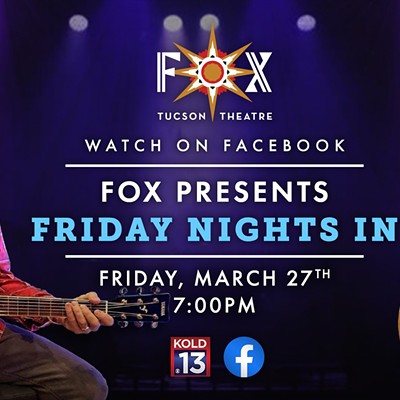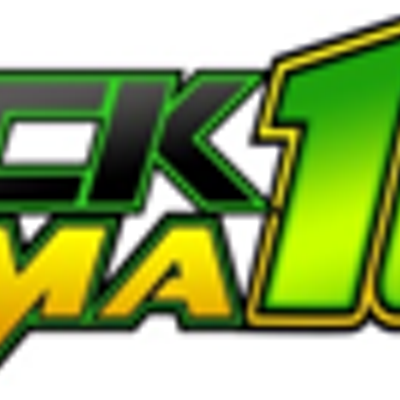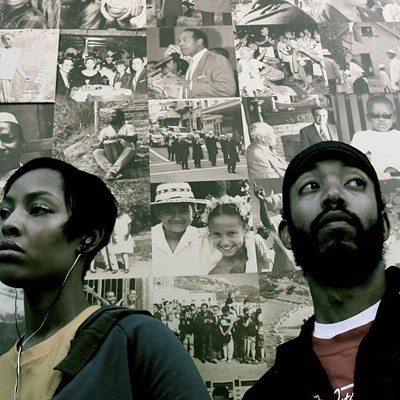But when David Eugene Edwards, leader of the gothic-industrial-Americana band Wovenhand, turns his profoundly deep voice to a biblically inspired lyric, he's not just exercising potent metaphors. The grandson of a Nazarene preacher on one side and a Native American storyteller on the other, Edwards grew up in awe of the church and nature. As a result, he still considers music-making a direct connection to the divine.
"Just like nature itself, music is a kind of theater that is simply another way of communication; basically, it's a way of communication between me and the listener, and between me and God, as is a lot of art in general," Edwards said in a recent phone interview.
He spoke from Salt Lake City, where his band was on the current Wovenhand concert tour, which will visit Tucson on Jan. 23.
Edwards' devotion to God is pretty clear: His MySpace page includes a link to a Christian Web site which espouses a literal translation of and strict adherence to biblical teachings.
One of the most moving and notable songs on Wovenhand's recently released fifth album, Ten Stones, is "Not One Stone," in which Edwards sings of sacrifice begetting redemption: "This weary melody ends / The host of heaven descends / Down beneath this bleeding ground / Behold the lamb / Behold the lamb / Given for us / Made curse for us."
But Edwards doesn't pretend that all of his fans will share his religion or spiritual beliefs.
"In my songs, I try to deal with things that just cause you to think, whatever your belief system happens to be," he said.
The foreboding drama in Wovenhand's music comes from a unique signature sound that combines elements of old-time country, dark-gothic themes, industrial drones and reverb-drenched rock guitars. The double bass, organ, piano, bandoneón, hurdy-gurdy and banjo are used in unconventional ways to create rich musical tapestries that are dense and rewarding.
Although Edwards primarily listens to traditional folk music--"Anything from Appalachian to Mongolian," he said--he is also a fan of challenging, experimental artists such as Einstürzende Neubauten and Brian Eno.
Native American imagery and mythology also are strong forces in Wovenhand's music, especially on new songs such as "Iron Feather" and "Kicking Bird."
"I love so much about many different cultures. I have Indian blood on both sides of my family. As an American kid, you grow up playing cowboys and Indians," he said, chuckling a bit.
"But for me, it goes beyond that. I have always gone to powwows and still do now. I think it's easy to add indigenous stuff to your music in a cheesy way--you know, some guy playing wooden flute--but I really want to incorporate this element in my music in ways that pay homage to the culture."
It helps that Edwards sings his songs in a dark, sepulchral moan, recalling at times the vocal instruments of Leonard Cohen, Scott Walker, Ian McCulloch and Nick Cave.
Edwards' inclusion on Ten Stones of a cover of the Antonio Carlos Jobim classic "Quiet Nights of Quiet Stars" might seem a little off the beaten path. But it works grandly, and there's a reason behind it.
"On every record, I do a song for my wife. That's a song we listen to around the house. I love Jobim's records, and we love Frank Sinatra, so to me, it makes perfect sense."
Edwards was born and raised in the Denver area, and still lives nearby. There was music around the house when he was a kid, but not much.
"In certain ways, it was a fairly minimal upbringing. We had a Johnny Cash record and a Hank Williams record. My dad listened to Buddy Holly, too.
"I didn't hear a lot of other music until junior high school, when I discovered Motorhead and AC/DC and stuff like that. I guess I was attracted to it because it was dark and heavy."
Edwards first began playing music when he was 13 or 14, he said. He dropped out of high school to play drums in a local band. "Then that ended, and I just started playing anything I could get my hands on, first guitar, then I went to the banjo."
Edwards' first band, 16 Horsepower, released a handful of albums and became indie-rock favorites. "It wasn't until then that I decided to become more than just a musician; I was now a singer and songwriter, because that was what was needed in that band."
When 16 Horsepower split up in 2001, Edwards began to write a new batch of songs that he at first recorded himself. Wovenhand was originally a solo project, but with Ten Stones, he has expanded to a full band that includes the assistance drummer Ordy Garrison, bassist Pascal Humbert and guitarist Peter van Laerhoven.
Edwards said he would make music no matter what; it's the only thing he really knows how to do. Until recently, he didn't even make a living from playing music.
Some fans have guessed that the band's name is a reference to hands folded in prayer. Edwards demurred: "It's really meant to be an inversion of hand-woven--you know, like this is handmade music."
And if you're confused whether the band's name is written as one word or two, Edwards said he goes back and forth. "I've written it both ways over the years, but at the moment, I am doing it as one word."
Although Wovenhand's music has often been called dark, gloomy or even apocalyptic, a strong thread of hope and, well, uplifting spirituality weaves through the band's music.
Edwards concurs.
"That's how I see it. But it really does kind of reveal itself to different people in different ways. It's all very abstract lyrically. In my mind, the songs are more like pictures I try to bring alive rather than stories to teach a lesson. And everyone sees a picture with different
interpretations."










